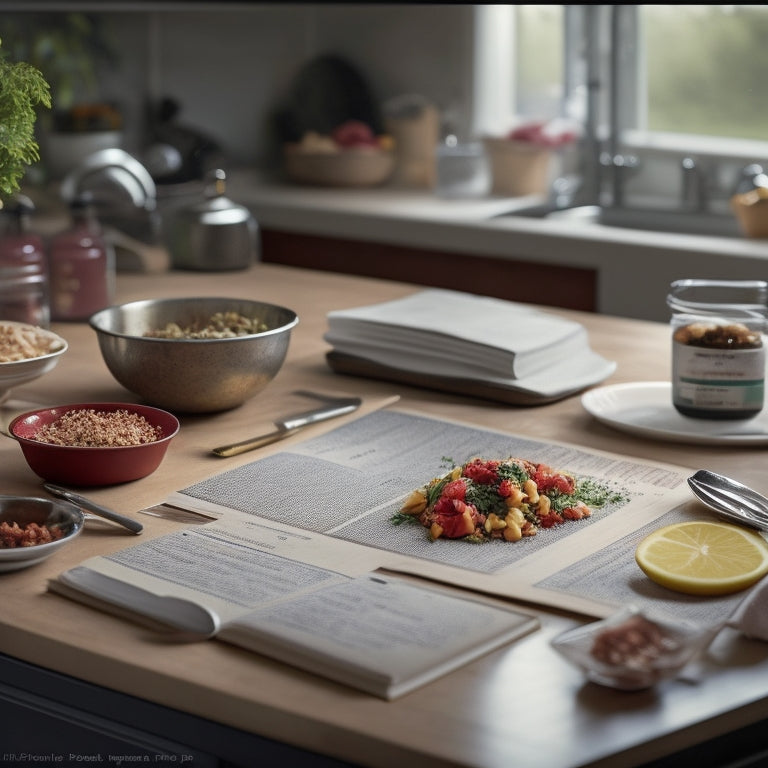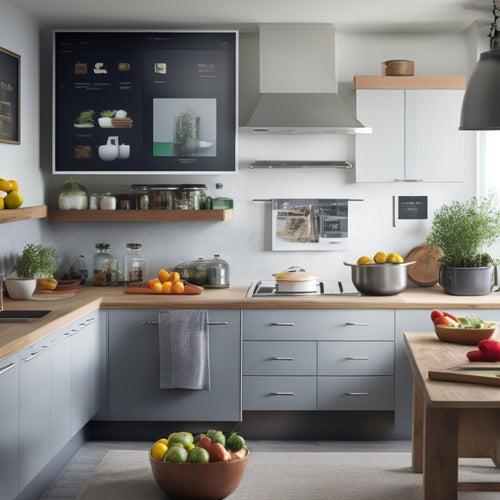
What's Holding You Back From Healthy Meal Prep?
Share
You're struggling to make healthy meal prep a habit, and it's not due to lack of motivation. You're likely held back by a combination of factors, such as limited meal planning skills, insufficient kitchen storage space, and unrealistic expectations. Maybe you're unsure where to start with cooking new recipes, or you're intimidated by meal prep containers. Your busy schedule and fear of wasting food and money might also be playing a role. Whatever the reason, it's time to identify your obstacles and address them. By understanding what's holding you back, you can start making progress towards a healthier, more balanced you.
Key Takeaways
• Lack of meal planning skills and inspiration leads to last-minute takeout and poor time management.
• Insufficient kitchen storage space and clutter hinder meal prep efficiency and organization.
• Unrealistic expectations and goals can lead to disappointment and discouragement in meal prep.
• Limited cooking skills and recipe variety result in reliance on the same dishes and culinary monotony.
• Poor time management and prioritization of health lead to sacrificing nutrition for convenience.
Lack of Meal Planning Skills
One of the primary obstacles standing between you and successful meal prep is a lack of meal planning skills, which can lead to a vicious cycle of last-minute takeout and unhealthy eating habits.
Without a clear plan, you'll struggle to come up with recipe inspiration, leaving you stuck in a rut of bland, unappetizing meals. This lack of inspiration can also lead to poor time management, as you'll spend more time deciding what to cook than actually cooking.
To overcome this hurdle, start by setting aside time each week to plan your meals. Browse cookbooks, food blogs, or social media for recipe inspiration. Create a schedule that outlines what you'll cook each day, and make a corresponding grocery list.
This will help you stay on track, saving you time and energy in the long run. With a solid plan in place, you'll be more likely to stick to your meal prep goals, and reap the benefits of healthy, home-cooked meals.
Insufficient Kitchen Storage Space
Organize your kitchen space by maximizing your storage capacity, as a cluttered kitchen can quickly become a major obstacle to successful meal prep. You can't efficiently prep healthy meals if you can't find what you need or have nowhere to store your ingredients.
To overcome this hurdle, get creative with your storage solutions. Install shelves, hooks, or a pegboard to hang frequently used items like pots, pans, and utensils. Use stackable containers or baskets to store dry goods, spices, and oils. Consider a cart or island with built-in storage to increase your counter space.
Don't forget about space-saving hacks like using the back of a cabinet door to store spices or oils, or attaching a magnetic board to the side of a cabinet to hold knives or other small items. By implementing these creative solutions, you'll be able to find what you need quickly, stay organized, and focus on prepping healthy meals.
A well-organized kitchen will make meal prep a breeze, allowing you to take control of your nutrition and achieve your health goals.
Unrealistic Expectations and Goals
Unrealistic expectations can undermine your meal prep efforts from the beginning, setting you up for disappointment and frustration when your ambitious goals clash with the reality of your busy schedule. You might be guilty of perfectionist tendencies, anticipating to cook intricate meals every day or having an immaculate kitchen. Newsflash: that's not maintainable!
| Unrealistic Expectations | Realistic Adjustments |
|---|---|
| Cooking gourmet meals daily | Aim for 3-4 nutritious meals per week |
| Having an impeccable kitchen | Focus on practical organization |
| Spending hours preparing meals | Start with 30-minute sessions |
| Making every meal from scratch | Incorporate convenient store-bought options |
| Sharing Instagram-worthy meals | Focus on fueling your body, not social media |
You might also fall into the comparison trap, scrolling through social media and feeling inferior to others' meal prep accomplishments. Remember, everyone starts somewhere, and it's crucial to concentrate on your own progress, not someone else's highlight reel. By adjusting your expectations and focusing on progress, not perfection, you'll be more likely to adhere to your meal prep goals and make lasting changes.
Limited Cooking Knowledge and Skills
Your lack of cooking skills and knowledge can pose a significant barrier to meal prep success, leaving you trapped in a culinary rut and relying on the same old recipes or takeout. This limited repertoire not only dulls your taste buds but also hinders your ability to explore healthier options. To break free from this cycle, expanding your cooking skills and knowledge is crucial.
Here are three key areas to focus on:
-
Recipe variety: Experiment with new cuisines, ingredients, and cooking methods to add diversity to your meal prep. This will help you stay enthusiastic about cooking and make sure you're getting a balanced diet.
-
Cooking techniques: Mastering various cooking methods, such as roasting, grilling, or sautéing, will enable you to prepare a wide range of dishes with confidence.
-
Meal prep strategies: Learn how to plan, shop, and prep meals efficiently, saving you time and cutting down on food waste.
Busy Schedule and Time Constraints
Time constraints can be a major obstacle to meal prep, as a packed schedule leaves little room for cooking, let alone planning and preparing healthy meals. You're not alone if you're sacrificing healthy eating for the convenience of fast food or meal delivery services. But, have you stopped to ponder the long-term health implications of these choices?
Here's a breakdown of the trade-offs:
| Option | Convenience | Cost | Health Impact |
|---|---|---|---|
| Meal Delivery Services | High | Medium-High | Processed ingredients, high sodium |
| Fast Food Alternatives | High | Low | High calorie, high fat, low nutrients |
| Meal Prep | Low-Medium | Low-Medium | Whole ingredients, balanced macronutrients |
| Grocery Store Meal Kits | Medium | Medium | Some processed ingredients, moderate sodium |
While meal delivery services and fast food alternatives may save time, they often come with a hefty price tag and detrimental health effects. By investing a bit of time in meal prep, you can reap the benefits of whole, nutritious ingredients and a balanced diet. It's time to take control of your schedule and prioritize your health.
Unhealthy Relationship With Food
Having an unhealthy relationship with food can manifest in emotional eating, restrictive dieting, or obsessive tracking, ultimately hindering your ability to develop a balanced and sustainable approach to meal prep. This toxic dynamic can stem from a lack of self-control, leading you to turn to food as a coping mechanism for emotional stress.
Here are three signs you may have an unhealthy relationship with food:
-
Emotional eating: You often find yourself reaching for comfort foods when you're feeling anxious, sad, or bored, rather than addressing the underlying emotions.
-
Body image issues: You have a distorted view of your body, constantly comparing yourself to others, and using food as a way to punish or reward yourself.
-
Comparison mentality: You're always comparing your diet to others, feeling like you're not doing enough, or that others are doing it better, leading to feelings of inadequacy and frustration.
Recognizing these patterns is the first step towards breaking free from an unhealthy relationship with food. By acknowledging and addressing these underlying issues, you can develop a healthier mindset and create a more balanced approach to meal prep that nourishes your body and soul.
Inadequate Meal Prep Containers
Do you find yourself struggling to keep your meals fresh and organized because you're using unsuitable containers that aren't designed for meal prep? Having the appropriate containers is vital for successful meal prep. You need a variety of containers that can accommodate different portion sizes, from small to large, to fit your specific meal prep needs.
Unsuitable containers can lead to spoiled food, messy leaks, and wasted time. That's why investing in containers that are durable, leak-proof, and designed specifically for meal prep is necessary. Look for containers with secure lids, airtight seals, and BPA-free materials.
Having the appropriate containers won't only keep your food fresh but also make meal prep more efficient. You'll be able to prep, store, and transport your meals with confidence, knowing your containers have got you covered.
Don't let unsuitable containers hold you back from achieving your healthy meal prep goals. Upgrade to meal prep containers that work for you, not against you.
No Clear Grocery Shopping Strategy
Without a clear grocery shopping strategy, you're left wandering the aisles, guessing what to buy and how much, which can lead to wasted money, expired ingredients, and a meal prep routine that's derailed before it even starts. This lack of planning often results in improper ingredient selection, leading to meals that are unbalanced or unappetizing.
Here are three common mistakes you might be making:
-
Failing to plan your meals: You can't shop effectively if you don't know what you're making. Take time to plan out your meals for the week, and make a list of the ingredients you need.
-
Not making a grocery list: Without a list, you're more likely to forget essential items or buy unnecessary ones. Stick to your list to avoid impulse purchases.
-
Not organizing your groceries: When you get home, your groceries can quickly become disorganized, leading to inefficient meal organization. Take the time to categorize and store your groceries properly, so you can easily find what you need when you need it.
Fear of Wasting Food and Money
Wasting food and money is a common anxiety that plagues many would-be meal preppers, as the thought of tossing spoiled vegetables or unused ingredients into the trash can be a significant deterrent to adopting a healthy meal prep routine. You're not alone in this concern, but addressing it directly is crucial to overcoming your fears and starting meal prepping with confidence.
| Fear | Reality |
|---|---|
| Wasting money on spoiled food | You can save up to 30% of your grocery bill by meal prepping and using up leftovers |
| Throwing away unused ingredients | With portion control, you can use up entire containers and avoid waste |
| Expiration dates are a mystery | Check expiration dates and plan your meals around them to make sure you use up food before it goes bad |
Frequently Asked Questions
How Do I Stay Motivated to Meal Prep Every Week?
'You're about to discover the secret to meal prep mastery! Stay motivated by prioritizing time management and consistency, while exploring budget-friendly options that offer endless variety - and watch your healthy habits soar!'
Can I Meal Prep if I Have Dietary Restrictions or Allergies?
You can absolutely meal prep with dietary restrictions or allergies by mastering ingredient substitutions and finding creative alternatives that cater to your needs, ensuring you stay on track and empowered.
Is Meal Prep Only for Healthy or Fitness-Focused Individuals?
You don't have to be a fitness enthusiast to meal prep; it's for anyone seeking convenience amidst busy schedules and limited time, debunking misconceptions that it's an intimidating process only for the health-obsessed.
Can I Reuse Last Week's Meal Prep Recipes or Get Bored?
You don't have to sacrifice recipe variety for convenience; mix and match last week's meal prep recipes to avoid food waste, and consider your time constraints and cooking skills to keep things exciting.
Are There Meal Prep Ideas for One Person or Small Households?
You can easily adapt meal prep to your solo needs! Focus on solo meal prep and small batch recipes, which cater to one person or small households, ensuring you waste less and enjoy fresh meals.
Related Posts
-

Streamline Your Kitchen With Digital Storage Solutions
By embracing digital storage solutions, you can transform your kitchen into a more efficient and clutter-free space. ...
